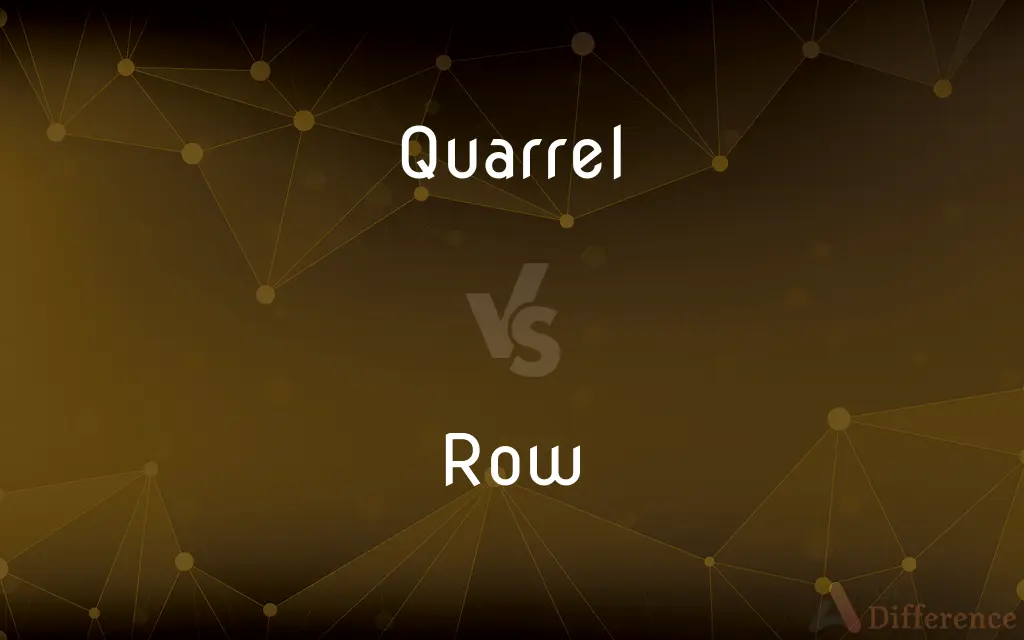Quarrel vs. Row — What's the Difference?
By Urooj Arif & Fiza Rafique — Updated on April 1, 2024
A quarrel is a verbal disagreement or argument, often between individuals known to each other, while a row is a loud, noisy dispute, possibly involving multiple people.

Difference Between Quarrel and Row
Table of Contents
ADVERTISEMENT
Key Differences
A quarrel typically refers to a disagreement or argument that is verbal in nature. It often involves a back-and-forth exchange between individuals or parties and can be relatively private or contained. In contrast, a row suggests a louder, more disruptive dispute that may attract attention due to its intensity or the involvement of several people.
Quarrels are usually characterized by a disagreement or conflict over specific issues, opinions, or actions, and while they can become heated, they often remain at a level where rational discussion is possible. Rows, on the other hand, imply a higher level of anger or frustration, potentially escalating to shouting or physical disturbances, and are less likely to involve calm negotiation or reasoned debate.
The term "quarrel" often connotes a personal disagreement that could be resolved through discussion or mediation, suggesting that the parties involved have a relationship or connection that might facilitate resolution. A "row," however, can occur between strangers or in public settings, where the dispute is more about immediate grievances or conflicts without an underlying relationship to mend.
Quarrels can arise from misunderstandings, differences in opinion, or conflicts of interest and might be resolved once the parties involved communicate effectively. Rows are often marked by stubbornness or a refusal to concede, sometimes resulting from or leading to a breakdown in communication, and may require intervention to de-escalate.
The choice between using "quarrel" or "row" can also depend on regional language preferences. In some dialects, "row" is a common term for any loud argument or dispute, while "quarrel" might be used more specifically to describe a disagreement between friends or family members.
ADVERTISEMENT
Comparison Chart
Nature
Verbal disagreement or argument
Loud, noisy dispute
Intensity
Can be heated but often remains verbal
Higher level of anger, may escalate
Context
Often between individuals known to each other
Can involve strangers, often public
Resolution
Possible through discussion
May require intervention
Communication
Characterized by back-and-forth exchange
Marked by shouting, less rational
Compare with Definitions
Quarrel
Involves arguing but can stay contained.
Their quiet quarrel was unnoticed by others at the party.
Row
May escalate beyond verbal disagreements.
What started as a debate turned into a row by the end.
Quarrel
A disagreement over opinions or actions.
They had a quarrel over dinner plans.
Row
Characterized by noisy disturbances.
The neighbors had a row that woke the entire street.
Quarrel
May involve emotions but not physical altercation.
Their quarrel grew heated but remained verbal.
Row
Marked by high emotions.
Their row left both parties feeling angry and unsettled.
Quarrel
Can often be resolved with discussion.
After their quarrel, they talked it out and apologized.
Row
Can attract attention due to intensity.
The row at the restaurant led to several complaints.
Quarrel
Usually occurs between people with a connection.
The siblings' quarrel ended as quickly as it started.
Row
Often requires cooling down or intervention.
After the row, they didn’t speak for days.
Quarrel
An interaction in which the parties involved express angry disagreement with one another
I changed the subject to avoid being drawn into a quarrel.
Row
A series of objects placed next to each other, usually in a straight line.
Quarrel
A reason for a dispute or argument
We have no quarrel with the findings of the committee.
Row
A succession without a break or gap in time
Won the title for three years in a row.
Quarrel
A bolt for a crossbow.
Row
A line of adjacent seats, as in a theater, auditorium, or classroom.
Quarrel
A tool, such as a stonemason's chisel, that has a squared head.
Row
A continuous line of buildings along a street.
Quarrel
A small diamond-shaped or square pane of glass in a latticed window.
Row
The act or an instance of rowing.
Quarrel
To express angry disagreement; engage in a quarrel
The children quarreled over the last piece of cake.
Row
A shift at the oars of a boat.
Quarrel
To find fault or disagree
I quarrel with your conclusions.
Row
A trip or an excursion in a rowboat.
Quarrel
(countable) A dispute or heated argument (especially one that is verbal).
We got into a silly quarrel about what food to order.
Row
A noisy or quarrel or disturbance.
Quarrel
(countable) Often preceded by a form of to have: a basis or ground of dispute or objection; a complaint; also, a feeling or situation of ill will and unhappiness caused by this.
A few customers in the shop had some quarrels with us, so we called for the manager.
I have no quarrel with her; it’s her partner whom I dislike.
Row
A loud noise.
Quarrel
A propensity to quarrel; quarrelsomeness.
Row
To place in a row.
Quarrel
An arrow or bolt for a crossbow or an type]] of crossbow, traditionally with the head square in its cross section.
Row
To use an oar or pair of oars in propelling a boat, typically by facing the stern and pulling the oar handle toward oneself, using an oarlock as a fulcrum to push the blade backward through the water repeatedly.
Quarrel
A diamond- or square-shaped piece of glass forming part of a lattice window.
Row
To propel (a boat) with oars.
Quarrel
A square tile; a quarry tile; (uncountable) such tiles collectively.
Row
To carry in or on a boat propelled by oars.
Quarrel
A cutting tool or chisel with a diamond- or square-shaped end.
Row
To use (a specified number of oars or people deploying them).
Quarrel
A small square-shaped opening in window tracery.
Row
To propel or convey in a manner resembling rowing of a boat.
Quarrel
To argue fiercely; to contend; to squabble; to cease to be on friendly terms, to fall out.
Row
To pull (an oar) as part of a racing crew.
Quarrel
(intransitive) To find fault; to cavil.
To quarrel with one’s lot
Row
To race against by rowing.
Quarrel
Followed by at: to disagree with; to take offence.
Row
To take part in a noisy quarrel or disturbance.
Quarrel
To argue or squabble with (someone).
Row
A line of objects, often regularly spaced, such as seats in a theatre, vegetable plants in a garden etc.
Quarrel
An arrow for a crossbow; - so named because it commonly had a square head.
To shoot with arrows and quarrel.
Two arblasts, . . . with windlaces and quarrels.
Row
A horizontal line of entries in a table, etc., going from left to right, as opposed to a column going from top to bottom.
Quarrel
Any small square or quadrangular member
Row
An act or instance of rowing.
I went for an early-morning row.
Quarrel
A glazier's diamond.
Row
(weightlifting) An exercise performed with a pulling motion of the arms towards the back.
Quarrel
A four-sided cutting tool or chisel having a diamond-shaped end.
Row
A noisy argument.
There was a row among the oarsmen about how to row.
Quarrel
A breach of concord, amity, or obligation; a falling out; a difference; a disagreement; an antagonism in opinion, feeling, or conduct; esp., an angry dispute, contest, or strife; a brawl; an altercation; as, he had a quarrel with his father about expenses.
I will bring a sword upon you that shall avenge the quarrel of my covenant.
On open seas their quarrels they debate.
Row
A continual loud noise.
Who's making that row?
Quarrel
Earnest desire or longing.
Row
To propel (a boat or other craft) over water using oars.
Quarrel
One who quarrels or wrangles; one who is quarrelsome.
Row
(transitive) To transport in a boat propelled with oars.
To row the captain ashore in his barge
Quarrel
To violate concord or agreement; to have a difference; to fall out; to be or become antagonistic.
Our people quarrel with obedience.
But some defect in herDid quarrel with the noblest grace she owed.
Row
(intransitive) To be moved by oars.
The boat rows easily.
Quarrel
To dispute angrily, or violently; to wrangle; to scold; to altercate; to contend; to fight.
Beasts called sociable quarrel in hunger and lust.
Row
(intransitive) To argue noisily.
Quarrel
To find fault; to cavil; as, to quarrel with one's lot.
I will not quarrel with a slight mistake.
Row
Rough; stern; angry.
Quarrel
To quarrel with.
Row
A noisy, turbulent quarrel or disturbance; a brawl.
Quarrel
To compel by a quarrel; as, to quarrel a man out of his estate or rights.
Row
A series of persons or things arranged in a continued line; a line; a rank; a file; as, a row of trees; a row of houses or columns.
And there were windows in three rows.
The bright seraphim in burning row.
Quarrel
An angry dispute;
They had a quarrel
They had words
Row
The act of rowing; excursion in a rowboat.
Quarrel
An arrow that is shot from a crossbow; has a head with four edges
Row
To propel with oars, as a boat or vessel, along the surface of water; as, to row a boat.
Quarrel
Have a disagreement over something;
We quarreled over the question as to who discovered America
These tewo fellows are always scrapping over something
Row
To transport in a boat propelled with oars; as, to row the captain ashore in his barge.
Row
To use the oar; as, to row well.
Row
To be moved by oars; as, the boat rows easily.
Row
An arrangement of objects or people side by side in a line;
A row of chairs
Row
An angry dispute;
They had a quarrel
They had words
Row
A long continuous strip (usually running horizontally);
A mackerel sky filled with rows of clouds
Rows of barbed wire protected the trenches
Row
(construction) a layer of masonry;
A course of bricks
Row
A linear array of numbers side by side
Row
A continuous chronological succession without an interruption;
They won the championship three years in a row
Row
The act of rowing as a sport
Row
Propel with oars;
Row the boat across the lake
Common Curiosities
How should one respond to a row in a public setting?
It's advisable to remain calm, avoid taking sides, and seek help from authorities or security if the dispute escalates or becomes threatening.
How can a row be de-escalated?
A row can be de-escalated by intervening to calm the parties, moving them to a private setting, or, if necessary, involving mediators or authorities.
Is a quarrel always between just two people?
While quarrels commonly occur between two individuals, they can also involve small groups, especially among people who know each other.
What causes a quarrel?
Quarrels are often caused by disagreements over specific issues, misunderstandings, or conflicts of interest between individuals.
Can a quarrel turn into a row?
Yes, a quarrel can escalate into a row if the disagreement intensifies, leading to louder and more disruptive behavior.
Are quarrels healthy in relationships?
Quarrels, when handled constructively, can be healthy for relationships as they allow for the expression and resolution of underlying issues.
What role does communication play in resolving quarrels?
Effective communication is crucial in resolving quarrels, as it allows for understanding, compromise, and finding mutual resolutions.
Why might someone prefer a quarrel to a row?
Some might prefer a quarrel over a row for its potential for resolution, lesser intensity, and because it usually remains a private matter.
What distinguishes a row from a simple argument?
A row is distinguished by its loudness, potential for public disruption, and higher emotional intensity compared to a typical argument.
Can rows be prevented?
Rows can often be prevented through effective communication, emotional regulation, and addressing issues before they escalate.
Can a quarrel be constructive?
Yes, quarrels can be constructive if they lead to better understanding, clearer communication, and resolutions that strengthen relationships.
What impact do quarrels and rows have on mental health?
Frequent quarrels and rows can be stressful and negatively impact mental health, highlighting the importance of resolution and healthy communication.
Is it better to walk away from a row?
In many cases, it may be wise to remove oneself from a row to avoid escalation and allow for cooling off, especially if the dispute is not directly related to you.
How can one effectively apologize after a quarrel?
An effective apology after a quarrel involves acknowledging one's role in the disagreement, expressing regret, and discussing ways to prevent future conflicts.
How do cultural differences impact perceptions of quarrels and rows?
Cultural differences can significantly impact how quarrels and rows are perceived, with some cultures valuing restraint and others being more expressive.
Share Your Discovery

Previous Comparison
Demeanour vs. Decorum
Next Comparison
Carbonization vs. CarbonationAuthor Spotlight
Written by
Urooj ArifUrooj is a skilled content writer at Ask Difference, known for her exceptional ability to simplify complex topics into engaging and informative content. With a passion for research and a flair for clear, concise writing, she consistently delivers articles that resonate with our diverse audience.
Co-written by
Fiza RafiqueFiza Rafique is a skilled content writer at AskDifference.com, where she meticulously refines and enhances written pieces. Drawing from her vast editorial expertise, Fiza ensures clarity, accuracy, and precision in every article. Passionate about language, she continually seeks to elevate the quality of content for readers worldwide.












































